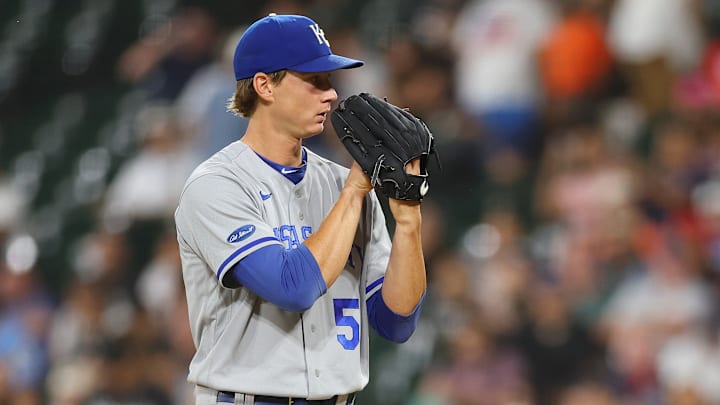STORY UPDATE: On Wednesday, over a day after this story first published, various media outlets began reporting that the original Friday deadline for the exchange of pay proposals between arbitration-eligible players and their clubs who haven't reached salary agreements for the 2024 season has been moved to Thursday. We have edited the story accordingly. Because the Friday date had been a bargained-for term of the current collective bargaining agreement, the players' union and clubs had to agree to the change.
Thursday marks the final big date of baseball's busy offseason, pre-spring training calendar. That's when arbitration-eligible players and clubs who haven't come to 2024 contract terms must exchange salary proposals. And unless the KC Royals and four of their pitchers reach agreements Thursday, they'll be primed for potential late January or February arbitration hearings.
Unsigned as of this writing are returning Kansas City hurlers Brady Singer andCarlos Hernández, and newcomers Nick Anderson, and Kyle Wright. Pitchers Kris Bubic and Josh Taylor already reached arbitration-avoiding agreements with the the Royals, who've historically been masters at sidestepping the process through negotiation.
The club also agreed to a 2024 deal with reliever Taylor Clarke before trading him to Milwaukee for a pair of minor leaguers in mid-December, but didn't worked out a deal with Edward Olivares before dealing him to the Pirates for Deivis Nadal; nor did they agree on new terms with Taylor Hearn or Josh Staumont before they rejected outright assignments to Triple-A Omaha and became free agents. Staumont has since signed with Minnesota.
So, what's the arbitration process hold for the quartet of unsigned Royals?
Arbitration presents risks for the KC Royals and their players
The failure to hammer out new agreements with remaining arbitration-eligible players will trigger the parties' mutual obligation to trade salary proposals which will form the basis of the decision-making process.
And it's a potentially dangerous process for both sides. Arbitration isn't mediation — a neutral person doesn't try to help the parties reach an agreement. Instead, and per baseball's current Basic Agreement, a neutral panel hears and considers both sides' arguments, then renders a winner-take-all decision: the panel picks one proposal or the other. There is no middle ground, and panel rulings are binding and final.
Does exchanging proposals lock arbitration in?
No. Contrary to what some may believe, players and clubs who can't cut new deals by Thursday's deadline haven't irrevocably committed themselves to an arbitration decision. Instead, they can continue to negotiate and, if they reach an accord before their hearing panel renders a ruling, commit themselves to their own, non-arbitrated salary agreement.
Has anyone predicted how the unsigned Royals might fare?
Yes. Major League Baseball Trade Rumors projected in November that, if they go to arbitration, Hernández should receive $1.3 million, Wright $1.4 million, Anderson $1.6 million, and Singer, who took Kansas City to hearing last winter but lost, $5.1 million.
